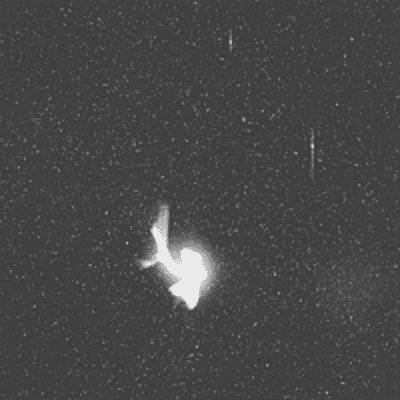Credit & Copyright: ROTSE Team
Explanation:
Tonight, a lucky few may see a meteor explode.
Over the next 36 hours the Earth will pass unusually
close to debris expelled from
Comet Tempel-Tuttle,
causing many sand-sized particles from this comet
to enter and burn up in the Earth's atmosphere.
This yearly
phenomenon is known as the
Leonids Meteor Shower, but the location
the Earth passes through this year holds
promise to provide particularly high activity.
The 1998 Leonids
was noteworthy for its many bright meteors.
In the
above slow-loading sequence, a 1998
Leonid was caught
exploding over Los Alamos, New Mexico.
In the last one-minute exposure,
another Leonid streaks past.
If tonight is clear, just grab a lawn chair
and a warm jacket, go outside, and
look up!
1999 2000 2001 2002 2003 2004 2005 2006 2007 2008 2009 2010 2011 2012 2013 2014 2015 2016 2017 2018 2019 2020 2021 2022 2023 2024 2025 |
Yanvar' Fevral' Mart Aprel' Mai Iyun' Iyul' Avgust Sentyabr' Oktyabr' Noyabr' Dekabr' |
NASA Web Site Statements, Warnings, and Disclaimers
NASA Official: Jay Norris. Specific rights apply.
A service of: LHEA at NASA / GSFC
& Michigan Tech. U.
|
Publikacii s klyuchevymi slovami:
Leonids - meteor - Leonidy - Meteor - Meteornyi potok
Publikacii so slovami: Leonids - meteor - Leonidy - Meteor - Meteornyi potok | |
Sm. takzhe:
Vse publikacii na tu zhe temu >> | |
